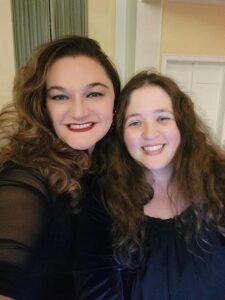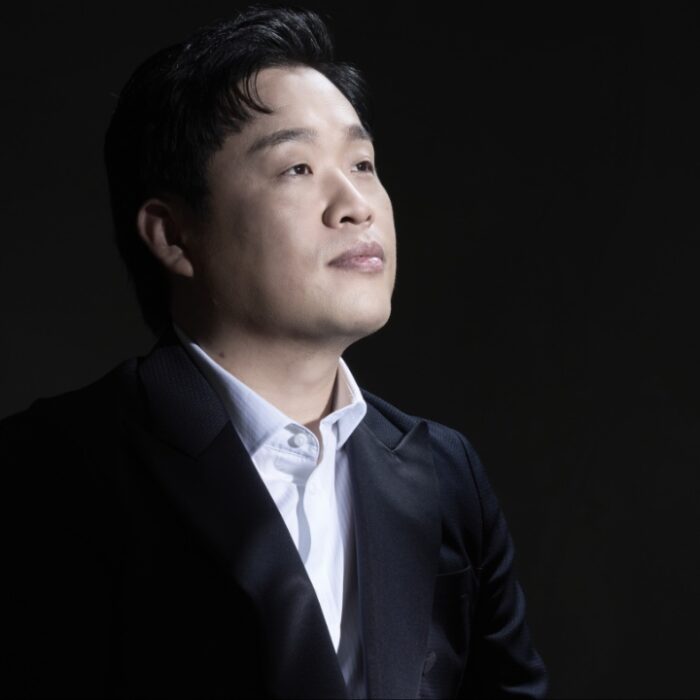
Girondines – The Story About How Kirsten C. Kunkle & Sarah Van Sciver Came Together to Create a New Opera
By David SalazarBack in 2016, Kirsten C. Kunkle and Sarah Van Sciver worked together for the first time. Kunkle performed as part of The Philadelphia Opera’s Collective, appearing in Van Sciver’s “Shadow House.”
However, they never met in person. In fact, their only communication was via social media.
But yet, they had a lasting impact on one another that would develop into something more.
“Before I wrote ‘Shadow House’ pieces, [librettist-director] Brenna [Geffers] informed me that Kirsten would portray the main historical figure for whom I was composing,” Van Sciver told OperaWire in a recent interview ahead of the West Coast Premiere of hers and Kunkle’s opera “Girondines” with Mission Opera. “When I listened to recordings of Kirsten performing, I was instantly wowed, and writing music tailored to her voice was a delight.”
From their brief exchanges they realized that they shared “an appetite to write impactful opera material for women, with plotlines which would pass the Bechdel test.”
When Van Sciver pitched Kunkle to write an opera, the Native American soprano, a voting citizen of the Mvskoke Nation, jumped at the opportunity.
“I sent her a message and said, ‘Let’s do it! Let’s write an opera!,'” Kunkle narrated. “I asked her to send me a list of topics that interested her, and she sent quite an extensive list, primarily of women in history and feminist icons.”
So, Van Sciver sent along a list of ideas. She didn’t get the response she was expecting.
“Ironically, I ended up choosing none of them, but it sent me down the rabbit hole of the Internet to do research,” Kunkle admitted before noting how her thoughts had already focused elsewhere.
“I had always had an interest in the story of Charlotte Corday, but I knew another opera existed about her (that opera is Lorenzo Ferrero’s “Charlotte Corday”).”
Ultimately, her research allowed her to realize that there were numerous other women that had powerful influence and political beliefs during the French Revolution.
Crafting a New Story
And away Kunkle went, crafting “Girondines,” which tells the story of six women from the French Revolution, including “philosophers, writers, an artist, a scientist, and… an infamous murderess… We know that at least a few of these women knew one another and were friendly, but this story enhances those relationships, and puts the emphasis on platonic friendships between women during an exceptionally turbulent time in history.”
Kunkle continued, “The story – at its core – is about humanity. Specifically, it is about friendships between women, despite society’s attempts to nullify the voice of women. Every one of our ‘Girondines’ was a strong woman of influence, in her own right. They each had a purpose beyond domesticity, and they had intense political beliefs that, in the case of half of them, cost them their lives. The story is tied together by their friendship. They are all together, physically sharing the same space, once in the entire opera. However, they are emotionally connected the entire time.
“The second act delves more deeply into the lives and belief systems of the remaining women, ultimately resulting in the executions of two more of their friend group. The piece ends on a more uplifting note, celebrating the accomplishments of the individuals, but more importantly their collective impact,” Kunkle added. “I know from personal experience how rarely you have more than one or two women in an opera at all, let alone characters that are complete people in their own rights, whose importance does not exist as a wife, mother, nun, witch, or pants role. The Girondines have similar political beliefs, ethics, morals (to a degree), and each brings her own strengths to the table to better the overall group. In realizing performances of this opera, we are able to see each performer bring her own strengths to the overall production, which, we hope will only be intensified in our first staged production.
The Music
Once the libretto was completed, Van Sciver set about creating the score by “improvising with piano, harp, voice, and electronics to generate themes, accompaniment, and soundscapes to capture our characters’ personalities, perspectives, and environments.”
“I began composing solo passages to hone each character’s palette before I tackled ensemble sections, writing melodies, then countermelodies, and then accompaniment,” Van Sciver noted about her process.
In the end, she created a score that gave each of the Girondine women their own unique motif, with variations of these themes interwoven throughout the work.
But the duo didn’t approach opera in the traditional manner. They aimed for a work that, like its story, which focuses on a diverse array of women, encompassed numerous art forms. In its promotional material, “Girondines” is described as an opera that brings together “theater, film, dance, fine art, literature, music, and the macabre.”
“Kirsten’s libretto prompted me to feature certain musical syntax and sensibilities. Leaning into ‘tragédie en musique’ traditions, several ‘Girondines’ pieces incorporate dance forms or choral stylings,” Van Sciver detailed. “My primary challenge was to make sure the cornucopia of genres, inspirations, and ideas I used didn’t create chaos for listeners or audience. Kirsten and I wanted for ‘Girondines’ performers and audiences to connect with and be entertained by our characters and story, and we didn’t want the music to be either overly predictable, or disorienting to those experiencing it. The music reflects each woman’s personality: Charlotte is fiery and passionate, Élisabeth is regal and romantic, Germaine is florid and provocative, Manon is conflicted (disciplined and dreamy), Olympe is defiant and emphatic, and Pierrette is elegant and precise.
Bringing It All Together
The opera had its premiere in-concert back in 2022 at Wilmington Concert Opera (founded by Kunkle). But the Mission Opera production, set to take place on Oct. 28 and 29 at the Canyon High School Performing Arts Center, will be fully-staged creating a condensed timeline for Kunkle and Van Sciver. Moreover, the two are taking on unique roles as well for the production.
“The entirety of our process of working with Mission Opera has been about two months, from first talks, to auditions, to countless meetings, to actually assembling together in person to rehearse, stage, choreograph, and put together a fully-staged opera,” Kunkle noted. “Sarah has stepped up to take on so many roles beyond composer and music director. Always working side by side to get my input, she has crafted the most phenomenal visual projections to accompany the soundscapes she designed for our world premiere concert version with Wilmington Concert Opera. She has done graphic design, she will do post-production video and audio editing, and so much more. I have taken on stage direction and choreography, which was exciting to me. I have a professional background in both of those elements, but only as a collegiate professor. This is my first time bringing them to the professional opera stage.”
“It has been an exciting challenge to bring everything together on an extremely tight timeframe,” added Van Sciver. “I am grateful to co-lead the production alongside Kirsten and a stellar MO cast and crew. I am also grateful to my teachers, colleagues, and fellow artists for helping me build creative skills, vocabulary, and flexibility to embrace various production roles. Having studied at CalArts, I am an advocate and practitioner of multidisciplinary artmaking, believing polydisciplinary productions to be ‘greater than the sum of their arts.’ It has been gratifying to tetris tasks for ‘Girondines’ as music director, technical director, production manager, pianist-conductor, and composer. It is fun to work in performing, visual, and literary arts capacities as well as using foreign language, arts administration, and business skills. I have thoroughly enjoyed writing detailed program notes about the French Revolution, our Girondines, and their world. It has also been a joy to lead teams to translate of Kirsten’s libretto into Spanish and French to increase the opera’s accessibility.”
The new production also provides opportunities to try new approaches and to revise the work. When the original premiere of performances forced the team to move forward without a harpist, Van Sciver had to reorchestrate her score (which had taken her six months) in just six days for a piano trio. But now, she has a chance to do it over with a harpist, and instead of just a harp and piano duo, as originally intended, she’s adding the violin and cello.
“Sarah is a dream collaborator. From the beginning of this project, she has always credited me first,” Kunkle noted. “She always asks my opinion and wants my input, which, in turn has made me, I believe, a better collaborator. Sarah wrote the music for the role of Charlotte Corday specifically for my voice, which means that we were able to discuss and work directly together to make it the best work we could to honor my voice.”
“Kirsten is an absolutely lovely creative partner. She is an exceptional vocalist, librettist, composer, educator, researcher, mentor, and friend. She is a passionate professional who deftly juggles motherhood, marriage, career, creativity, and community service with compassion, patience, and determination,” added Van Sciver.
The Mission Opera performances will take place on Oct. 28 and 29 and the duo is hoping that the audience walks away with a unique experience.
“In a perfect world, the audience would want to learn more about these historical women, singers would want to use the arias for auditions, and opera fans would realize just how lacking the canon is to feature the abundance of fantastic women singers that exist in our industry,” concluded Kunkle. “Sarah and I hope that ‘Girondines’ is a step in the direction to promote the stories of phenomenal women through women’s voices. If the audience leaves with any of those inclinations, I believe we will have done our jobs.”
“Women are still fighting for their voices. Gender disparity pervades opera composer, librettist, and performer distribution, and stereotypes dominate lead roles. Stories about real women and their personal goals, desires, and relationships with one another shift opera audience perspectives to be more inclusive of women’s lived experiences,” added Van Sciver. “The ‘Girondines’ story epitomizes inequities, turmoil, abuse, and violence with which women continue to wrestle, struggling for autonomy of mind, body, and soul. Women worldwide pursuing science, literature, arts, and activism are still threatened. Opera itself is one of the battlegrounds on which women still fight to be fairly represented and treated in life and art. Team Girondines is proud to harness the power of opera in pursuit of a better future.
“I hope that ‘Girondines’ entertains, educates, and haunts audiences with catchy music and resonant stories showcasing timeless struggles by women to be seen, heard, respected, safe, supported equals in society. I hope that this feminist opera propels forward necessary conversation and change to improve diversity, inclusivity, equity, and access in opera, new music, and across the arts.”


